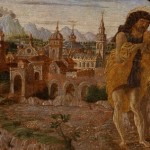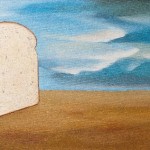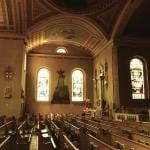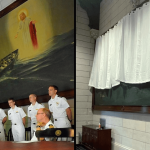 2 Peter 1:1-11
2 Peter 1:1-11
Is it just me – or does St. Peter in this passage deal with the same theme we just saw in Colossians – that God is absolutely sovereign and man is accountable before Him? Isn’t this another variation on the theme of God’s grace in our lives and the necessity of good work?
If I didn’t know better, I’d think God was trying to tell us something and coordinating this whole thing!
To me, the most extraordinary verse in 2 Peter is right here in verse 4. After saying in verse 3 that God, through His divine power, has given us all things that pertain to life and godliness, he then goes on to say that through these things He has enabled us to be partakers of the divine nature. These words are so strange and wonderful that many of us have trouble taking them in a literal sense. And yet that is what Peter says.
For those who can accept the mystery of Christ in us, as St. Paul expresses so many times, this should not be so strange. And yet it is. But if God has chosen to dwell with man, then these things must be so. If Jesus Christ became man to save man, and if the Holy Spirit of God dwells in His Holy Temple, which is His people, then in some sense we must be partakers of the divine nature.
One of my favorite theological concepts – because of the wonder of its meaning, because of its mystery, and because of the sheer coolness of the word – is that of perichoresis (in its Anglicized version, “circumincession.”) Perichoresis means that the Father, the Son, and the Holy Spirit all interpenetrate one another so that what can be said of one can be said of another. Without this understanding, the Trinity falls apart and disintegrates into polytheism. It is also true of the human Jesus because His divine and human natures interpenetrate so that it is not really possible to separate one from the other.
Finally, the mystery of salvation is that the divine nature in some way interpenetrates sinful men like me. This is why I can say that Christ is in me and that my life is hidden in Him. It is why Jesus can speak of us abiding in Him and Him in us (John 15:4) and can say that if we keep His commandments we abide in His love (John 15:10.)
If the divine nature of Christ is not in some sense applied to me, then how can I receive the righteousness of Christ which is His alone? I am not righteous or holy on my own. I am not acceptable to the Father on my own. But if I am united to Christ by baptism, faith, and faithfulness, then I am worthy of being in the presence of God, because the presence of God is already with me through Christ.
If any of us really understood what this meant for our lives, it would revolutionize them – as well as all of those around us.
How some people can take this amazing gift of grace – the gift of God Himself – and use it as an excuse to continue to act selfishly and in sin is truly beyond me. What St. Peter says is that for this very reason, that is, precisely because God has made us partakers of His divine nature, we are to produce the fruits of the Spirit. That is (verses 5-7) God has made us partakers of the divine nature for the purpose that we might act divinely. Because God has allowed us to participate in His divine nature and because the Holy Spirit truly lives in us and with us, we are to manifest the fruits of the Spirit: faith, virtue, knowledge, self-control, perseverance, godliness, brotherly kindness, and love.
Peter, in fact, says that if we have these things and abound in them, we will not be barren or unfruitful (verse 8.) I think this is why St. Paul calls them the fruits of the Spirit: both that they are the fruit of the Holy Spirit living in us and that these fruits will then go on to produce the fruit of good works. Again, if we are partakers of the divine nature because Christ is in us through the Holy Spirit, then we will do the good works that God has planned beforehand for us to walk in.
I might even add one more kind of perichoresis, a perichoresis of the fruits of the Spirit. Rather than seeing this list of fruits of the Spirit in verses 5-7 as being separate items from which we can shop, Peter regards them as essentially linked. Knowing that love is the bond of perfection (Colossians 3:14) and sums up all the commandments – we can see all of the fruits of the Spirit as diverse species of the genus of love. And the same love of God that binds together the persons of the Trinity binds together all of the fruits of the Spirit.
So then, God and His love which has always perichoresed (I think I just made up a new word!) in the Trinity now perichoreses in us as God is in us through Christ and causes the fruits of the Spirit to perichorese with our lives, our faith, and our works.
Peter goes on to confirm the point that God’s presence in our lives perichoreses with our faith and good works when he exhorts us to “be even more diligent to make your call and election sure” (verse 10.) God has elected us, but we are still to make our election sure by obeying God in love and manifesting the fruits of the Spirit we say lives within us.
I find this to be the strongest possible motivation for the Christian life: both that God has elected me and given me His sure promises, and that I am to make my call and election sure. All formal theology aside, to me, this is the best of both sides of the debate over predestination and free will. Whether from God’s side or yours, because he has made you a partaker of the divine nature, you are to be diligent to be as God has commanded you to be: faithful, virtuous, knowledgeable, self-controlled, persevering, godly, kind, and loving.
If you do these things, you will never stumble. If you do these things, “an entrance will be supplied to you abundantly into the everlasting kingdom of our Lord and Savior Jesus Christ” (verse 11.)
Prayer: Father, thank You for sharing Your love and nature with me that I may be equipped to gain entrance into the everlasting kingdom of my Lord and Savior Jesus Christ. By Your grace, may I manifest more and more abundantly the fruits of Your Holy Spirit in my life, that I may make my call and election sure.
Point for Meditation:
- Meditate on the things God has done in Your life that demonstrate that you have been made a partaker of the divine nature, for example, your faith and the good works that God has done through you.
- Treasure in your heart today, as the Virgin Mary did, the mystery that God has chosen you to be His vessel of love and grace.
- If you feel so led, continue your previous meditation on practicing the presence of God that in love all fruits of the Spirit might live.
Resolution: I resolve to ponder the mystery of Christ within me and that I am a partaker of the divine nature.
© 2015 Fr. Charles Erlandson















